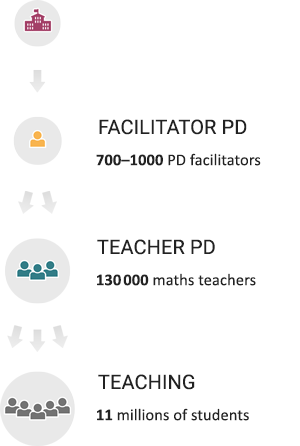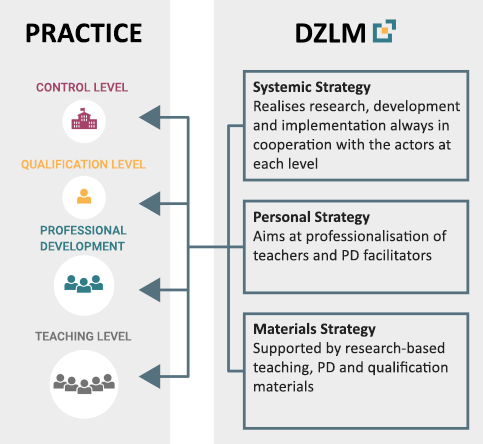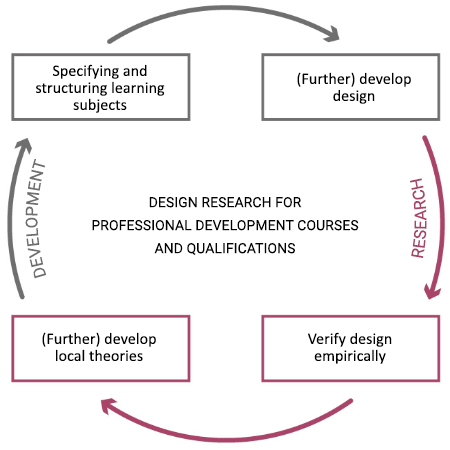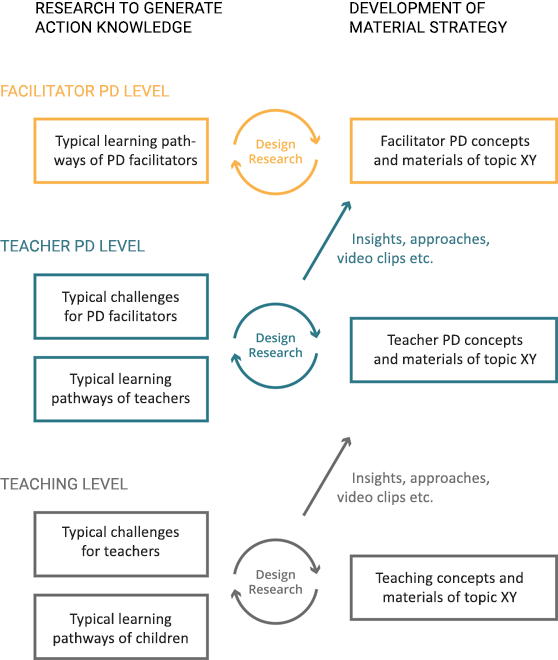WHAT WE DO
Effective subject-related professional development – a joint challenge for science and practice
The DZLM develops, implements and researches effective offers of professional development and support in mathematics for teachers and professional development (PD) facilitators (counsellors, PD trainers and instructors). For this purpose, we work closely together with the practice on several levels:
- with responsible persons from State Institutes, Ministries and District Governments for the professional development of teachers and the facilitators,
- with PD facilitators for the professional development of teachers and educators,
- with teachers, educators and school/child day-care centre managers for subject-related teaching development.

In particular, the effective support and preparation of PD facilitators is the focus of the activities of the DZLM with the aim of implementing, together with those responsible at the control level, subject-related development and facilitator PD concepts on a broad basis.
Challenges of the subject teaching
Teachers are faced with the challenge of combining didactic and subject-specific aspects with general pedagogical goals and approaches in subject teaching, and in particular in mathematics and natural sciences, as well as putting them into practice in the subject. Educators in day-care centres are confronted with similar challenges when they implement the subject-related goals of the educational and orientation plans.
The DZLM has set itself the goal - together with those responsible in practice - of supporting teachers and educators. The following professional development topics are currently being addressed:
- Digital Education
Which didactic potentials do digital media have and how can they be used in subject teaching?
- Subject-related language training
How exactly can the consideration of language for subject learning be implemented?
- Heterogeneous learning groups
How can the heterogeneity of learners be met with subject-specific flexible strategies of differentiation?
- Competences related to big mathematical ideas
How can big mathematical ideas and process-related aspects of subject teaching be combined in such a way that the students' competences in the subject are promoted?
- Out-of-field teachers as well as lateral entrants
What support does this specific group of teachers need in developing their subject teaching?
- Early mathematical education
How can curiosity about mathematics be awakened and encouraged in day-care children?
Mutual interlinking of science and practice
In order to meet the didactic challenges of subject teaching, effective concepts and appropriately designed teaching materials are required. Their development and implementation requires the methods, resources and perspectives of science as well as the experience, perspectives and knowledge of practical application contexts.
The transfer of knowledge is generally defined as the dissemination of scientific knowledge into practical fields. In this context, it is not a matter of a unilateral transfer, but of a communicative and cooperative process that is oriented towards the framework conditions and working methods of practice (see also Position Paper of the State Institutes and Quality Institutes of the federal states on the Transfer of Research Knowledge, in German): We therefore understand the transfer of knowledge in the sense of the guiding principle "Leibniz-transfer" of the Leibniz Association:
The Leibniz Association understands successful transfer of knowledge as the target group-specific and quality assured translation of scientific findings as well as vice versa the integration of central issues from society into research projects. Therefore, it fulfills a interface function in two directions.
What exactly does subject-related knowledge transfer from research to practice mean?
Knowledge that is generated in research together with practice usually has three goals:
- to identify problems (descriptive knowledge)
- to understand backgrounds (explanatory knowledge)
- to work on problems (action knowledge)
In order to identify relevant problems, descriptive knowledge is created (e.g. in benchmarking studies such as PISA or class observation studies). Once a relevant problem has been identified, further research is needed to generate explanatory knowledge on the background of the problem (e.g. through learning process studies). Descriptive and explanatory knowledge alone is not enough to work on and solve a problem in concrete terms. In design research studies, action knowledge for the development of teaching concepts is created.
At the DZLM, we contribute to a successful transfer from science to practice by developing action knowledge at all three levels: the teaching, teacher PD and facilitator PD level. The relevant descriptive and explanatory knowledge flows substantially into our work - whether generated by the DZLM or by others.
Transfer of knowledge into the classroom through professional development courses for facilitators and teachers
Why does the DZLM use advanced training and preparation to integrate scientific findings into practice? It is known from transfer and implementation research on educational processes that teachers change their teaching practices only to a limited extent on the basis of practice-related publications or teaching materials. Instead, support services are needed that are well thought-out, embedded in the systems of the federal states and planned and implemented jointly with them. This means that, in terms of didactic development and research results, knowledge transfer does not take place on a broad scale directly from research to teaching, but above all via professional development courses and support for teachers and PD facilitators.
At the DZLM we develop and research concepts and materials for professional development courses for teachers and facilitators. Within this framework, we integrate research-based concepts and materials for mathematics instruction. In order to solve problems in practice, the DZLM generates action knowledge at the teacher PD and facilitator PD level. This includes relevant descriptive and explanatory knowledge, of course. Research knowledge on the teaching and control level also flows into our work.
In generating knowledge, the DZLM works closely with practical actors at all three levels (teaching, teacher PD and facilitator PD). At the teaching level, for example, teachers are involved in the development, testing and overhaul of teaching units. For the teacher PD level there are, among other things, long-term professional learning communities of PD trainers and instructors in DZLM networks, which identify current needs with DZLM researchers and test the suitability of concepts of teacher PD courses. With regard to the facilitator PD level, for example, the DZLM exchanges information with the control level at the annual meetings of the DZLM Regional Advisory Council on the needs and concepts of preparations for PD facilitators and plans joint facilitator PD projects if necessary.
Implementation Strategies of the DZLM Transfer Programme
The DZLM Transfer Programme uses three strategies (see figure below) to implement subject-related knowledge transfer in practice and to better understand how it succeeds:
- The material strategy aims to support teachers with teaching materials and PD facilitators with PD materials as Open Educational Resources.
- The personal strategy aims to professionalise teachers through professional development courses for teachers and facilitator preparation.
- The systemic strategy aims at cooperation with the respective systems, i.e. at the teaching level with the individual school system, at the teacher PD and facilitator PD level with the country-wide and regional professional development institutions and with the educational control system, in order to identify with them the conditions for concrete country-wide implementations.
The subject-related topics and contents in the three strategies are oriented at all levels to the professional development topics of the DZLM.

Research foundation of the three strategies on three levels
For each of the strategies, we at the DZLM aim to create action knowledge at the teacher PD and facilitator PD level and thus contribute to a research-based transfer into school practice.
Research foundation of the material strategy
For the development of materials for teaching, teacher PD and facilitator PD, design research studies (see illustration below) specify more precisely the respective subject matter of teaching, teacher PD and facilitator PD. Subsequently, it is structured in such a way that it is adapted to the prerequisites of the learners at the respective level. Based on the structured learning subject, we design our material offers and test them in practice (design experiments). We investigate whether the intended learning processes are triggered by the practical use of our materials and which typical learning paths are taken. We use these findings to further develop local theories (theories that apply to the investigated learning subject) as well as our materials by sharpening the learning subjects and design principles. In addition, we investigate how materials are used and adapted for their purposes by the respective actors in facilitator PD and teacher PD practice.
Research foundation of the personal strategy
For the research foundation of the personal strategy, insights into the learning paths and learning hurdles of teachers and PD facilitators are particularly necessary in order to be able to prepare the respective lecturers for teacher professional development courses or facilitator preparation courses. We investigate the effectiveness of the DZLM PD courses for teachers and facilitator in intervention studies.
Research foundation of the systemic strategy
All our support services are designed in such a way that they take into account the respective systemic contexts and integrate the experiences of those responsible in practice. These and other results of school development and implementation research are incorporated into the work of the DZLM.

Research fields of the DZLM
Currently, we at the DZLM focus on four empirical research fields in order to scientifically substantiate our implementation strategies:
- Teachers' learning pathways at teacher PD level
- Learning pathways of PD facilitators at facilitator PD level
- Effects and effectiveness of courses for teacher PD and facilitator PD
- Use of DZLM material ranging from facilitator PD to mathematics instructions
A selection of DZLM publications can be found under Research Fields. In addition, further DZLM publications on content-related professionalisation research are compiled there, dealing with programmatic, structural and strategic aspects of this research.
Interaction of research, development and implementation across all levels of practice
In summary, it can be said that we develop our teacher PD, facilitator PD and support offers in mathematics in a close interaction of content-related research, development and implementation with and in practice. We link the teaching, teacher PD and facilitator PD levels with each other through scientific findings and practical development products (cf. figure).

Further literature (mostly German)
- DZLM Fortbildungsthemen | Frühe mathematische Bildung
- DZLM Spotlight | Digitale Bildung in Unterricht, Fortbildung und Qualifizierung
- Walter, 2018 | Nutzungsweisen bei der Verwendung von Tablet-Apps
- Leuders & Prediger, 2016 | Flexibel differenzieren und fokussiert fördern im Mathematikunterricht
- Selter, 2017 | Mathe ist Trumpf – Guter Mathematikunterricht
- Selter, 2017 | Mathe ist Trumpf – Materialien
- Selter & Zannetin, 2019 | Das KIRA-Buch: Kinder rechnen anders
- Selter & Zannetin, 2018 | Mathematik unterrichten in der Grundschule
- Porsch, 2019 | Fachfremd unterrichten (Themenheft)
- Selter & Rösken-Winter, 2019 | Erfordernisse, Konzepte, Erfahrungen – Fortbildungen für fachfremd Mathematik Unterrichtende
- Binner, 2019 | Fachfremde Lehrkräfte fortbilden – Erfahrungen als Fortbildnerin
- Götze, 2015 | Sprachbildender Mathematikunterricht in der Sekundarstufe - ein forschungsbasiertes Praxisbuch
- Prediger, 2019 | Mathematische und sprachliche Lernschwierigkeiten - Empirische Befunde und Förderanstätze am Beispiel des Multiplikationskonzepts
- Prediger & Ademmer, 2019 | Gemeinsam zum Volumen von Quadern : Eine inklusive und sprachsensible Unterrichtsreihe
- Prediger, Sahin-Gür, 2019 | Wege zum sprachsensiblen Mathematikunterricht der Oberstufe - Beispiele und Hintergründe
- Bieber, Egyptien, Klein, Oechslein & Pikowsky, 2018 | Positionspapier der Landesinstitute und Qualitätsreinrichtungen der Länder zum Transfer von Forschungswissen
- Deutsche Forschungsgemeinschaft | Erkenntnistransfer
- Kultusministerkonferenz, 2016 | Gesamtstrategie der Kultusministerkonferenz zum Bildungsmonitoring
- Leibnitz-Gemeinschaft, 2018 | Leitbild "Leibnitz-Transfer"
- Gräsel, 2010 | Stichwort: Transfer und Transferforschung im Bildungsbereich
- Hasselhorn, Köller, Maaz & Zimmer, 2014 | Implementation wirksamer Handlungskonzepte im Bildungsbereich als Forschungsaufgabe
- Maaß & Artigue, 2013 | Implementation of inquiry-based learning in day-to-day teaching: a synthesis
- Prediger, 2019 | Design-Research in der gegenstandsspezifischen Professionalisierungsforschung – Ansatz und Einblicke in Vorgehensweisen und Resultate
- Prediger, Schnell & Rösike, 2016 | Design Research with a focus on content-specific professionalization processes: The case of noticing students' potential
- Prediger, Leuders & Rösken-Winter, 2017 | Drei-Tetraeder-Modell der gegenstandsbezogenen Professionalisierungsforschung: Fachspezifische Verknüpfung von Design und Forschung
- Prediger, Link, Hinz, Hußmann, Thiele & Ralle, 2012 | Lehr- Lernprozesse initiieren und erforschen – Fachdidaktische Entwicklungsforschung im Dortmunder Modell
- Prediger, Rösken-Winter & Leuders, 2019, online first | Which reserach can support PD facilitators? Research strategies in the Three-Tetrahedron Model for content-related PD research
- Wilhelm, Zwetzschler, Selter & Barzel | Vertiefung, Erweiterung und Verbindung von Wissensbereichen im Kontext der Planung einer Fortbildungsveranstaltung zum Thema ‚Rechenschwierigkeiten’
- Bruns, Eichen & Gasteiger | 2017 Mathematics-related competence of early childhood teachers visiting a continuous professional development course: An intervention study
- Dreher, Holzäpfel, Leuders & Stahnke | 2018 Problemlösen lehren lernen – Effekte einer Lehrerfortbildung auf die prozessbezogenen mathematischen Kompetenzen von Schülerinnen und Schülern
- Prediger, Quasthoff, Vogler & Heller, 2015 | How to elaborate what teachers should learn? Five steps for content specification of professional development programs, exemplified by "moves supporting participation in classroom discussions
- Leufer, Prediger, Mahns & Kortenkamp, 2019 | Facilitators' adaption practices of curriculum material resources for professional development courses
- Schüler & Rösken-Winter, 2018 | Compiling video cases to support PD facilitators in noticing productive teacher learning
- Prediger & Pöhler, 2019 | Conducting PD discussions on language repertoires: a case study on facilitators' practices
- IEEM TU Dortmund | Fachdidaktische Entwicklungsforschung


